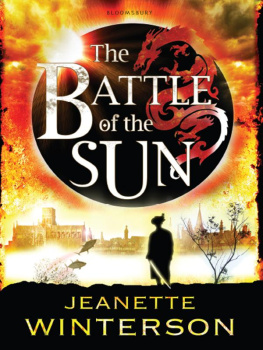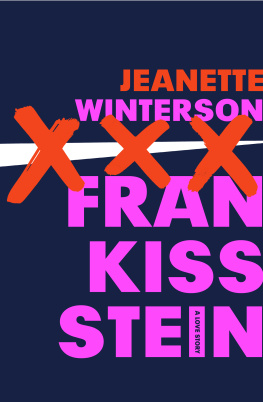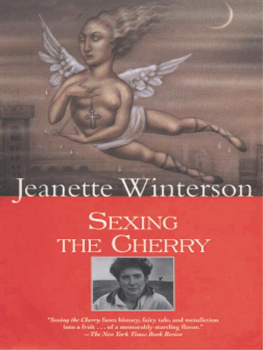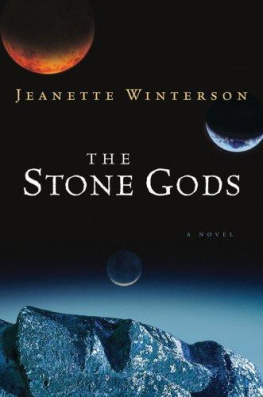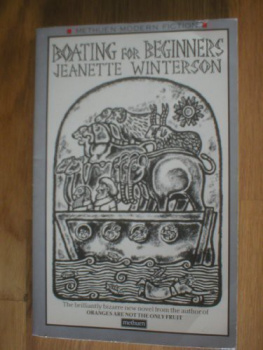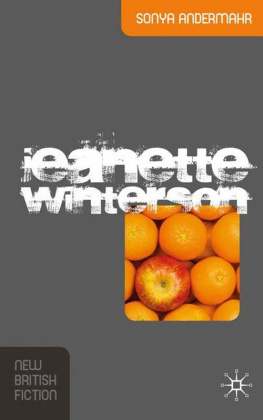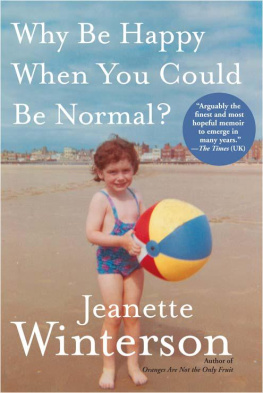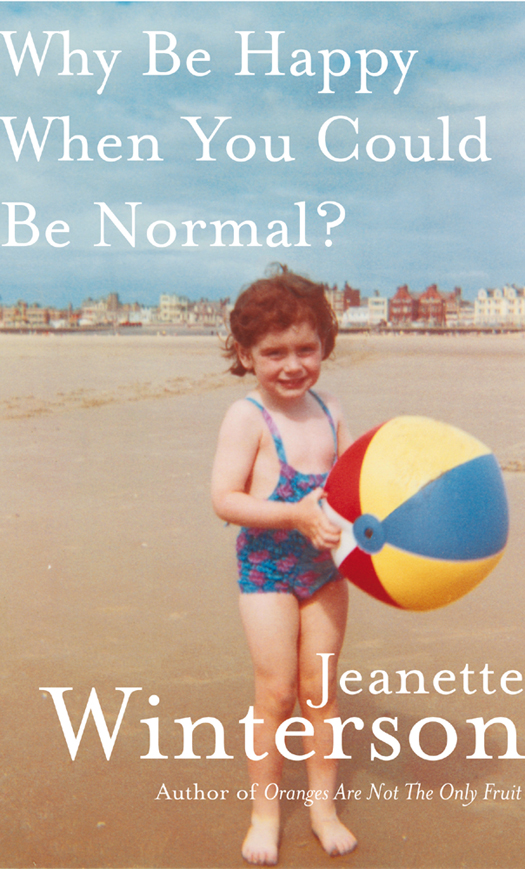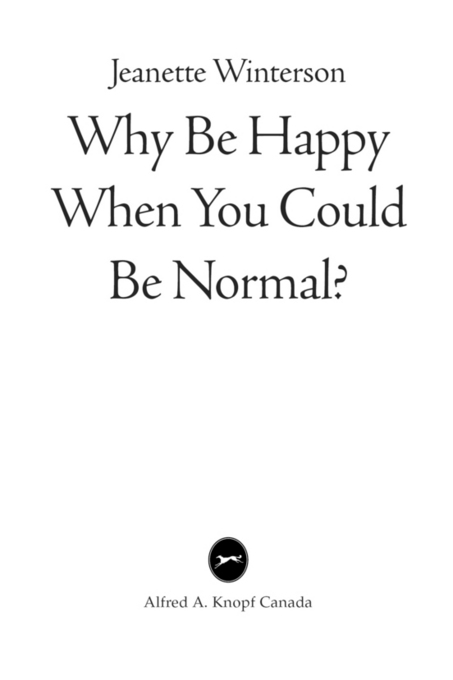ALSO BY JEANETTE WINTERSON
Fiction
Oranges Are Not The Only Fruit
The Passion
Sexing the Cherry
Written on the Body
Art & Lies
Gut Symmetries
The World and Other Places
The Powerbook
Lighthousekeeping
Weight
The Stone Gods
Non-Fiction
Art Objects
Comic Book
Boating for Beginners
Childrens Books
Tanglewreck
The King of Capri
The Battle of the Sun
The Lion, the Unicorn and Me
Screenplays
Oranges Are Not the Only Fruit (BBC TV)
Ingenious (BBC TV)
PUBLISHED BY ALFRED A. KNOPF CANADA
Copyright 2011 Jeanette Winterson
All rights reserved under International and Pan-American Copyright Conventions. No part of this book may be reproduced in any form or by any electronic or mechanical means, including information storage and retrieval systems, without permission in writing from the publisher, except by a reviewer, who may quote brief passages in a review. Published in 2011 by Alfred A. Knopf Canada, a division of Random House of Canada Limited, Toronto, and simultaneously in the United Kingdom by Jonathan Cape, a division of The Random House Group, Ltd., London. Distributed in Canada by Random House of Canada Limited.
www.randomhouse.ca
Knopf Canada and colophon are registered trademarks.
Burnt Norton from Four Quartets by T. S. Eliot. Reproduced by kind permission of Faber and Faber Ltd. The Rowing Endeth from The Complete Poems of Anne Sexton by Anne Sexton (Houghton Mifflin, 1981), Anne Sexton, reprinted by permission of Stirling Lord Literistic Inc.
Library and Archives Canada Cataloguing in Publication
Winterson, Jeanette, 1959
Why be happy when you could be normal? / Jeanette Winterson.
eISBN: 978-0-307-40126-7
1. Winterson, Jeanette, 1959 Childhood and youth. 2. Winterson, Jeanette, 1959 Family. 3. Novelists, English20th centuryBiography. 4. LesbiansGreat BritainBiography. 5. Winterson, Jeanette, 1959 Oranges are not the only fruit. I. Title.
PR6073.I558Z46 2011 823.914 C2011-901894-2
Image credits: courtesy of the author
v3.1
To my three mothers:
Constance Winterson
Ruth Rendell
Ann S.
With love and thanks to Susie Orbach.
Thanks as well to Paul Shearer who traced the family tree. To Beeban Kidrons helpline! To Vicky Licorish and the kids: my family. To all my friends who stood by me. To Caroline Michel fantastic agent and fabulous friend. And to everyone at Cape and Vintage who believed in this book especially Rachel Cugnoni and Dan Franklin.
CONTENTS
1
The Wrong Crib
W HEN MY MOTHER WAS ANGRY with me, which was often, she said, The Devil led us to the wrong crib.
The image of Satan taking time off from the Cold War and McCarthyism to visit Manchester in 1960 purpose of visit: to deceive Mrs Winterson has a flamboyant theatricality to it. She was a flamboyant depressive; a woman who kept a revolver in the duster drawer, and the bullets in a tin of Pledge. A woman who stayed up all night baking cakes to avoid sleeping in the same bed as my father. A woman with a prolapse, a thyroid condition, an enlarged heart, an ulcerated leg that never healed, and two sets of false teeth matt for everyday, and a pearlised set for best.
I do not know why she didnt/couldnt have children. I know that she adopted me because she wanted a friend (she had none), and because I was like a flare sent out into the world a way of saying that she was here a kind of X Marks the Spot.
She hated being a nobody, and like all children, adopted or not, I have had to live out some of her unlived life. We do that for our parents we dont really have any choice.
She was alive when my first novel, Oranges Are Not the Only Fruit, was published in 1985. It is semiautobiographical, in that it tells the story of a young girl adopted by Pentecostal parents. The girl is supposed to grow up and be a missionary. Instead she falls in love with a woman. Disaster. The girl leaves home, gets herself to Oxford University, returns home to find her mother has built a broadcast radio and is beaming out the Gospel to the heathen. The mother has a handle shes called Kindly Light.
The novel begins: Like most people I lived for a long time with my mother and father. My father liked to watch the wrestling, my mother liked to wrestle.
For most of my life Ive been a bare-knuckle fighter. The one who wins is the one who hits the hardest. I was beaten as a child and I learned early never to cry. If I was locked out overnight I sat on the doorstep till the milkman came, drank both pints, left the empty bottles to enrage my mother, and walked to school.
We always walked. We had no car and no bus money. For me, the average was five miles a day: two miles for the round trip to school; three miles for the round trip to church.
Church was every night except Thursdays.
I wrote about some of these things in Oranges, and when it was published, my mother sent me a furious note in her immaculate copperplate handwriting demanding a phone call.
We hadnt seen each other for several years. I had left Oxford, was scraping together a life, and had written Oranges young I was twenty-five when it was published.
I went to a phone box I had no phone. She went to a phone box she had no phone.
I dialled the Accrington code and number as instructed, and there she was who needs Skype? I could see her through her voice, her form solidifying in front of me as she talked.
She was a big woman, tallish and weighing around twenty stone. Surgical stockings, flat sandals, a Crimplene dress and a nylon headscarf. She would have done her face powder (keep yourself nice), but not lipstick (fast and loose).
She filled the phone box. She was out of scale, larger than life. She was like a fairy story where size is approximate and unstable. She loomed up. She expanded. Only later, much later, too late, did I understand how small she was to herself. The baby nobody picked up. The uncarried child still inside her.
But that day she was borne up on the shoulders of her own outrage. She said, Its the first time Ive had to order a book in a false name.
I tried to explain what I had hoped to do. I am an ambitious writer I dont see the point of being anything; no, not anything at all, if you have no ambition for it. 1985 wasnt the day of the memoir and in any case, I wasnt writing one. I was trying to get away from the received idea that women always write about experience the compass of what they know while men write wide and bold the big canvas, the experiment with form. Henry James did no good when he said that Jane Austen wrote on four inches of ivory i.e. tiny observant minutiae. Much the same was said of Emily Dickinson and Virginia Woolf. Those things made me angry. In any case, why could there not be experience and experiment? Why could there not be the observed and the imagined? Why should a woman be limited by anything or anybody? Why should a woman not be ambitious for literature? Ambitious for herself?
Mrs Winterson was having none of it. She knew full well that writers were sex-crazed bohemians who broke the rules and didnt go out to work. Books had been forbidden in our house Ill explain why later and so for me to have written one, and had it published, and had it win a prize and be standing in a phone box giving her a lecture on literature, a polemic on feminism



